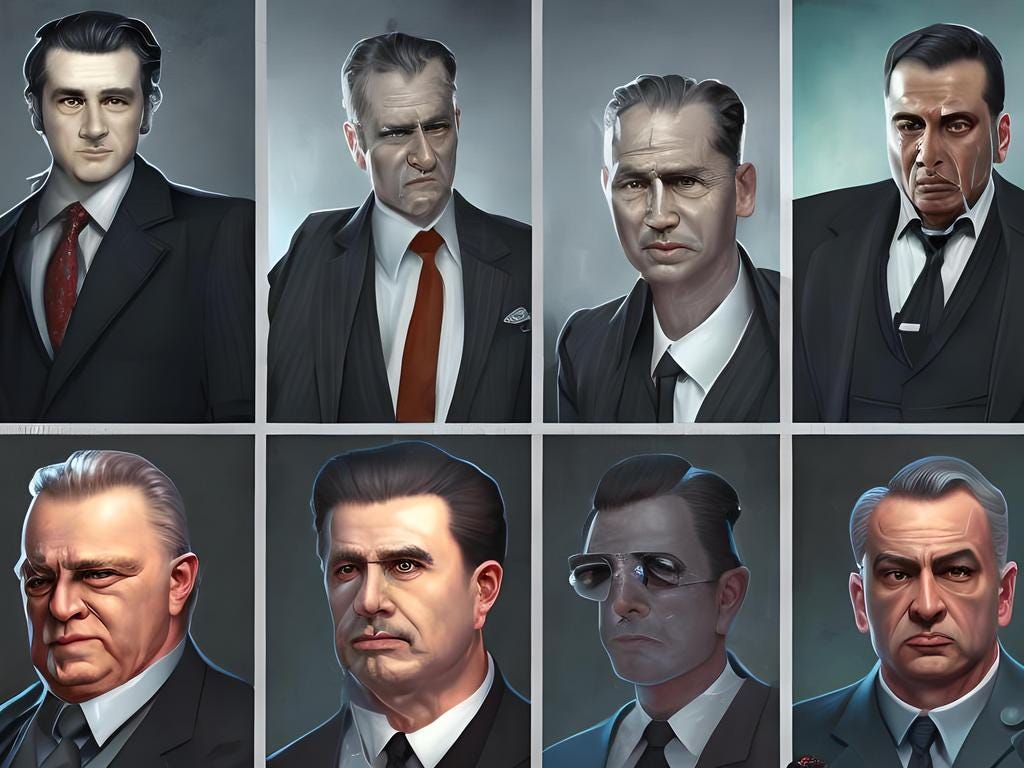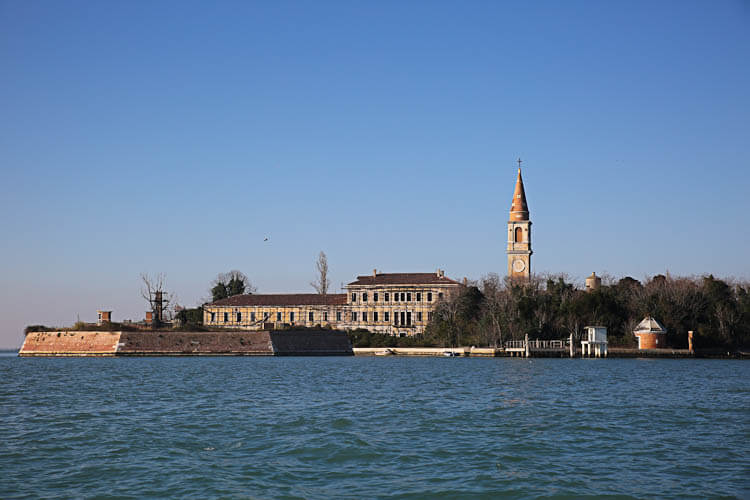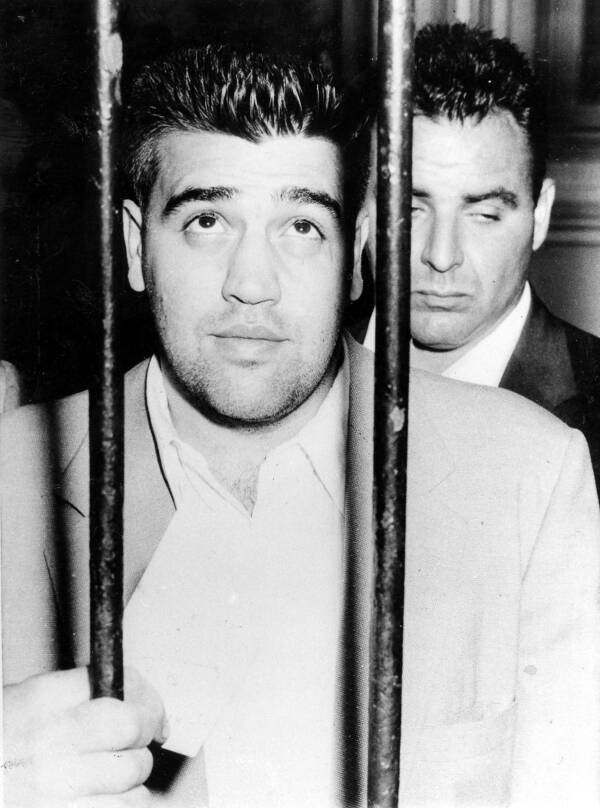Legendary Crime Lords: The Ruthless Mafiosos Who Ruled the Underworld
Discover the most notorious mafia names male, the infamous mob bosses who shaped organized crime and influenced culture worldwide.
Notorious Mafia Names Male: The Crime Lords Behind the Infamy
Mafia bosses are often glorified as ruthless yet charismatic figures. These crime lords shaped the underworld with their illegal operations, massive criminal empires, and violent tactics. From Italy to the US, these figures became synonymous with organized crime, their names still evoking fear and fascination today.
These mobsters didn’t just operate within their territories. They built global crime networks that continue to influence modern criminal organizations. From Al Capone in Chicago to Charles “Lucky” Luciano, the founder of the modern American Mafia, these men left an indelible mark on history. Below, we’ll examine these legendary crime lords, their mafioso power plays, and how their influence shaped global organized crime.
Origins of Organized Crime: The Rise of Mafia Power
The Mafia’s roots can be traced back to 19th-century Sicily, where local clans rose to power by controlling land and offering “protection” to citizens. This system expanded rapidly, particularly during periods of unrest and economic decline. The Sicilian Mafia perfected the art of extortion, protection rackets, and political corruption, creating a model followed by other organized crime groups.
When Italian immigrants brought these traditions to the US in the late 19th and early 20th centuries, they laid the groundwork for the American Mafia. Notable bosses like Salvatore Maranzano and Joseph Masseria played key roles in organizing these gangs into what would become a powerful criminal network. Charles “Lucky” Luciano, the architect of the modern mafia, reorganized the structure, introducing a more business-oriented, hierarchical system.
- Long-tail keyword: rise of organized crime in the US
- LSI keywords: Sicilian Mafia, extortion, protection rackets
Legendary Mafia Bosses Who Shaped the Underworld
The mob bosses at the top of this hierarchy are remembered for their brutal efficiency and immense influence. Here’s a look at some of the most infamous mafia names male who dominated the world of crime.
Al Capone: The Kingpin of Chicago
Known for his ruthless reign over Chicago, Al Capone was a household name during the Prohibition era. His bootlegging operations, gambling dens, and brothels made him a multimillionaire by his mid-20s. His name is still synonymous with the corruption of the 1920s.
Table: Al Capone’s Biography
| Name | Alphonse Gabriel Capone |
|---|---|
| Born | January 17, 1899, Brooklyn, NY |
| Famous for | Chicago Crime Syndicate, bootlegging |
| Notable Crimes | St. Valentine’s Day Massacre |
| Downfall | Convicted for tax evasion, 1931 |
- Semantic entity: Al Capone
- Relation: led
- Object: Chicago Crime Syndicate
Charles “Lucky” Luciano: Architect of the American Mafia
The Italian-American mobster Charles “Lucky” Luciano revolutionized the mafia by creating a structure that allowed for better organization and cooperation between crime families. He formed the National Crime Syndicate, a governing body that would settle disputes among mafia bosses and divide territories.
Luciano’s brilliance lay in his ability to organize. He helped found the infamous Five Families of New York, a system that endured for decades.
John Gotti: The Dapper Don
John Gotti took control of the Gambino crime family in the 1980s and became a media sensation for his stylish appearance and brash personality. Known as the Dapper Don, Gotti was notorious for his ability to evade conviction—until he was finally brought down by the FBI in 1992.
The Global Reach of Mafia Power: Beyond Italy and the US
The Mafia’s influence isn’t confined to Italy and the United States. Over the decades, organized crime syndicates with mafia-like structures have flourished in other parts of the world, particularly in Russia and Japan.
In Russia, the Russian Mafia—also known as the Bratva—rose to power after the collapse of the Soviet Union, controlling a wide range of illegal activities. In Japan, the Yakuza operates in a similarly hierarchical manner, running businesses in industries from construction to gambling.
- EVA: Russian Mafia, controls, illegal activities
- ERE: Yakuza, operates, Japan
Infamous Mob Bosses in Media: The Glorification of Crime Lords
One of the reasons for the enduring fascination with mafia bosses is their portrayal in media. Movies, TV shows, and documentaries often present these crime lords as complex, even sympathetic characters.
Mafia in Hollywood: The Godfather Effect
The 1972 film The Godfather not only immortalized the Corleone family but also contributed to the romanticized vision of the mafia. Movies like Goodfellas and Scarface continued this trend, showing crime lords as anti-heroes who straddled the line between ruthlessness and family loyalty.
“It’s not personal, Sonny. It’s strictly business.” — The Godfather
The Downfall of Mafia Empires: How Law Enforcement Took Down Crime Lords
Though many of these mob bosses seemed untouchable for years, law enforcement agencies eventually caught up to them. By the 1980s, tactics like the RICO Act, wiretaps, and witness protection programs played key roles in dismantling the criminal empires.
FBI’s Role in Taking Down Mob Families
The FBI used innovative approaches, such as infiltrating the mafia with undercover agents, gathering crucial evidence that led to indictments. John Gotti, once untouchable, was eventually taken down by testimony from his former underboss, Salvatore “Sammy the Bull” Gravano.
- Semantic triple: FBI, brought down, John Gotti
- Entity-Relation-Entity: John Gotti, was betrayed by, Sammy Gravano
Witness Protection and Turning Informants
One of the most effective tools for law enforcement has been the Witness Protection Program. Turning mafia members into informants was a gamble that paid off when key figures began cooperating with the authorities to avoid prison time.
The Legacy of Infamous Mafia Names: Impact on Modern Organized Crime
Even after the downfall of the most notorious crime lords, their legacy lives on. Modern organized crime groups still emulate many of the practices developed by these mafia bosses, from money laundering to corrupting politicians.
How Mafia Practices Evolved Over Time
The mafia’s structure and methods have adapted to the 21st century. Instead of relying solely on extortion or bootlegging, modern crime families invest in legitimate businesses to launder money, making it harder for law enforcement to track them.
Modern-Day Mafia: Continuation of Crime Lord Empires
While some of the most famous names have faded from the spotlight, organized crime is still very much alive. Whether it’s the Ndrangheta in Italy or the Sinaloa Cartel in Mexico, criminal empires continue to evolve and expand, cementing the legacy of the infamous mafia bosses who came before them.
FAQs
Q1: What was Al Capone’s biggest crime?
Al Capone’s most infamous crime was likely his involvement in the St. Valentine’s Day Massacre, where seven members of a rival gang were gunned down in broad daylight.
Q2: Who was the most influential mafia boss in history?
Many consider Charles “Lucky” Luciano the most influential boss due to his role in creating the National Crime Syndicate and reorganizing the mafia’s structure.
Q3: How did John Gotti avoid conviction for so long?
Gotti avoided conviction by intimidating witnesses and jury members until his underboss, Sammy Gravano, testified against him.
References:
https://www.historydefined.net






